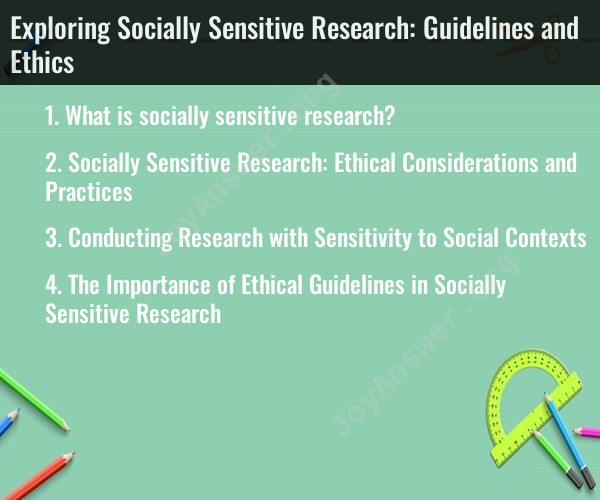What is socially sensitive research?
Socially sensitive research refers to the study and investigation of topics, questions, or issues that have the potential to raise ethical, moral, or societal concerns due to their nature, potential consequences, or impact on individuals, communities, or society as a whole. These topics often involve issues related to human behavior, social dynamics, and the well-being of individuals or groups. Socially sensitive research can encompass a wide range of subjects, including but not limited to:
Social Justice and Inequality:
- Research on issues related to race, ethnicity, gender, sexual orientation, socioeconomic status, or disability, which may expose disparities and inequalities in society.
Mental Health and Well-being:
- Studies on topics like depression, addiction, self-harm, or other mental health concerns that may affect individuals' well-being.
Sexuality and Relationships:
- Research on sexual orientation, gender identity, intimate relationships, or sexual behaviors, which can be personal and sensitive subjects.
Violence and Abuse:
- Investigations into domestic violence, child abuse, sexual assault, or other forms of violence and abuse, which can be emotionally challenging.
Sensitive Medical and Health Topics:
- Studies on terminal illnesses, reproductive health, or stigmatized health conditions that may affect individuals' privacy and emotional well-being.
Criminal Justice and Legal System:
- Research on the criminal justice system, incarceration, wrongful convictions, or law enforcement practices that may involve legal and ethical considerations.
Controversial Social and Political Issues:
- Research on contentious topics such as immigration, abortion, gun control, or political extremism, which can evoke strong emotions and polarize opinions.
Stigmatized or Marginalized Populations:
- Studies focusing on marginalized or vulnerable groups, including the homeless, refugees, or individuals living with HIV, which may involve ethical concerns related to representation and respect.
Socially sensitive research is often essential for advancing knowledge and addressing societal problems. However, conducting such research requires a heightened awareness of ethical considerations and the potential impact on participants and communities. Researchers engaged in socially sensitive research should adhere to strict ethical guidelines and principles, which may include:
Informed Consent: Ensuring that all participants provide informed consent to participate, understanding the nature and purpose of the research, and being aware of potential risks and benefits.
Anonymity and Confidentiality: Safeguarding the privacy of participants by protecting their identities and sensitive information.
Debriefing: Offering post-research debriefing sessions to address potential emotional or psychological distress among participants.
Cultural Sensitivity: Recognizing and respecting cultural differences and potential biases that may affect the research process and outcomes.
Data Security: Safeguarding data collected during the research to prevent breaches and unauthorized access.
Minimizing Harm: Taking steps to minimize the potential harm or discomfort caused to participants during the research process.
Ethical Oversight: Receiving approval and oversight from ethical review boards or committees when conducting research on sensitive topics.
Dissemination: Communicating research findings responsibly, emphasizing the potential implications and ethical considerations in the dissemination of results.
Beneficence and Non-maleficence: Balancing the potential benefits and harms of the research, ensuring that it contributes to knowledge while avoiding harm to participants or society.
Socially sensitive research requires a deep commitment to ethical principles, a high level of empathy, and a recognition of the potential impact of research on individuals and society. Researchers should be aware of the responsibility that comes with conducting such research and the need to navigate ethical dilemmas effectively.
Socially Sensitive Research: Ethical Considerations and Practices
Socially sensitive research is research that involves groups or individuals who are marginalized, discriminated against, or at risk. This type of research can be important for understanding and addressing social problems, but it also raises a number of ethical concerns.
Some of the key ethical considerations in socially sensitive research include:
- Informed consent: Participants in socially sensitive research must be fully informed of the purpose of the research, the risks and benefits of participation, and their right to withdraw from the study at any time.
- Confidentiality: Researchers must protect the confidentiality of participants' data and identities.
- Power dynamics: Researchers must be aware of and address the power dynamics that may exist between themselves and participants.
- Harm: Researchers must minimize the risk of harm to participants, both physical and psychological.
Conducting Research with Sensitivity to Social Contexts
In addition to the ethical considerations listed above, researchers must also be sensitive to the social contexts in which they are conducting their research. This means being aware of and respectful of the cultural norms, values, and beliefs of the communities they are working with.
Some specific practices that researchers can use to conduct research with sensitivity to social contexts include:
- Building relationships with community members: Researchers should take the time to build relationships with community members before beginning their research. This will help to ensure that the research is conducted in a culturally appropriate and respectful manner.
- Empowering participants: Researchers should empower participants by giving them a voice in the research process and by sharing the results of the research with them.
- Giving back to the community: Researchers should consider ways to give back to the communities they are working with. This could involve donating to local charities or organizations, or providing training or resources to community members.
The Importance of Ethical Guidelines in Socially Sensitive Research
Ethical guidelines are important in socially sensitive research because they help to protect participants and ensure that the research is conducted in a responsible and ethical manner.
Some of the benefits of following ethical guidelines in socially sensitive research include:
- Protecting participants: Ethical guidelines help to protect participants from harm, both physical and psychological.
- Building trust: Ethical guidelines help to build trust between researchers and participants. This is essential for conducting successful research.
- Promoting social justice: Ethical guidelines help to promote social justice by ensuring that research is conducted in a fair and equitable manner.
Researchers who conduct socially sensitive research have a responsibility to follow ethical guidelines. By doing so, they can help to ensure that their research is conducted in a way that is respectful of participants and beneficial to society.













